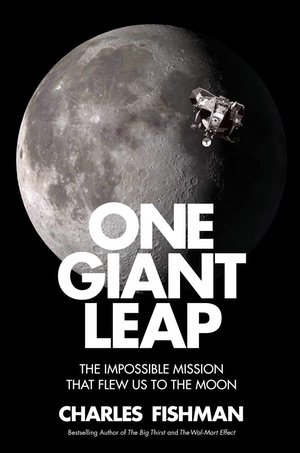Review: One Giant Leapby Jeff Foust
|
| “The success is the very age we live in now,” he argues early in the book. “The race to the Moon didn’t usher in the Space Age; it ushered in the Digital Age.” |
That is an interesting argument to make, but Fishman doesn’t spend much of the book fleshing it out. (It ignores, for example, the role the Air Force’s Minuteman missile program played in stimulating demand for integrated circuits; as Paul Ceruzzi noted in his book A History of Modern Computing, both programs played key roles in the rise of integrated circuits, with Minuteman coming first.) Fishman undermines his own argument just a few pages into this discussion: “Would we have had microchips and laptops without Apollo? Of course.” NASA should still get credit for its role, he says, but it’s clear that the technology would have developed anyway even without that early race to the Moon.
A couple of chapters in the book do explore the development of the Apollo computers and software; these are among the most interesting chapters in the book. But there’s no flow to much of the book: after those chapters, Fishman then go to the “secret” tapes made by President Kennedy of his discussions about Apollo (which, of course, have not been secret for decades), the development of the lunar module, and the process by which NASA decided to and selected a flag to fly on the lander; those last two chapters are about the same length. It’s certainly not a detailed or chronological account of Apollo, but rather a hodgepodge of topics about the program.
Fishman returns to that reconsideration of Apollo in the final chapter of the book. It is a bit defensive, arguing, as he did earlier in the book, that it helped begin the “Digital Age” and wasn’t a waste of money. “We love space,” he said. “We are not, in fact, bored by the romance and adventure of our own space travel.” Yet, as he acknowledges elsewhere in the book, public support for Apollo was never strong until Apollo 11 itself, and television audiences dropped dramatically for the landings after Apollo 11. The public’s interest in space, then and now, is broad but not deep.
Rather than attempting to redefine the meaning of success for Apollo, as this book attempts to do, let’s accept Apollo for what it was: a tremendous programmatic success thanks to both technological accomplishments as well as skilled management, stimulated and supported by Cold War geopolitics. Trying to redefine it makes as little sense as trying to duplicate it, as decades’ worth of failed initiatives have demonstrated. If human spaceflight does have a long-term future, on the Moon, Mars, or elsewhere, it will look very different from Apollo.
Note: we are temporarily moderating all comments subcommitted to deal with a surge in spam.
